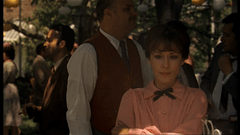Sandra Corleone
| Sandra Corleone | |
|---|---|
|
Julie Gregg portraying Sandra Corleone | |
| First appearance | The Godfather |
| Created by | Mario Puzo |
| Portrayed by | Julie Gregg |
| Information | |
| Gender | Female |
| Occupation | Homemaker |
| Family | Corleone |
| Spouse(s) | Santino Corleone (husband, deceased) |
| Relatives | Vito Corleone (father-in-law) |
Sandra Corleone is a fictional character appearing in Mario Puzo's novel The Godfather, the Godfather film trilogy, and the Godfather video game. She was portrayed by Julie Gregg in the first film.[1]
Role in The Godfather
Born in 1917, she married Sonny Corleone, with whom she had four children:
- Francesca Corleone (Born 1937)
- Kathryn Corleone (Born 1937)
- Frank Corleone (Born 1939)
- Santino Corleone, Jr. (Born 1945)
Sonny is a womanizer, and has a mistress, Lucy Mancini, with whom he fathers Vincent Corleone. Vincent would grow up to succeed Michael as the Don of the Corleone family in The Godfather Part III.
In the novel, further details of Sandra's life are given; she is depicted as a large-breasted woman who immigrated from Italy when she was a child. She is unable to tolerate having sex with her husband, due to his extremely large penis; she is aware, and apparently thankful, that he is unfaithful. She and Sonny live in a house in the Corleone Mall. After Sonny's death, she takes her children to live with her parents in Florida.
Sandra appears in a deleted scene in The Godfather Part II, trying to gain her brother-in-law Michael's blessing for her daughter Francesca's engagement. Michael approves but suggests that her fiance change his college studies. In a deleted subplot, Sandra becomes Tom Hagen's mistress, a fact that Michael uses to blackmail Hagen into remaining loyal to the family, despite Sandra urging Hagen to abandon the Corleone family. In the final film, Hagen is depicted as having died years earlier.
Role in sequel novels
Sandra is a minor character in The Godfather Returns and The Godfather's Revenge, Mark Winegardner's sequels to Puzo's novel. In The Family Corleone, she appears as a teenager, the granddaughter of Signora Colombo, a minor character in the original novel.
Family Members
- Vito Corleone — Father-in-law; played by Marlon Brando in Godfather I, played by Robert De Niro in Godfather II
- Carmela Corleone — Mother-in-law; played by Morgana King
- Sonny Corleone — Husband; played by James Caan
- Constanzia "Connie" Corleone — Sister-in-law; played by Talia Shire
- Fredo Corleone — Brother-in-law; played by John Cazale
- Michael Corleone — Brother-in-law; played by Al Pacino
- Tom Hagen — Unofficially adopted brother-in-law; played by Robert Duvall
- Mary Corleone — Niece; played by Sofia Coppola
- Anthony Vito Corleone — Nephew; played by Anthony Gounaris in The Godfather, played by James Gounaris in Godfather Part II, played by Franc D'Ambrosio in Godfather Part III
References
- ↑ "The Godfather (1972)". nytimes.com. Retrieved 2014-07-06.
